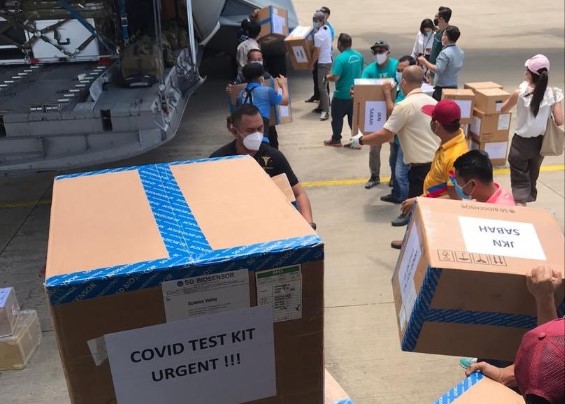KUALA LUMPUR, Oct 30 — Sabah now relies on antigen rapid tests to detect Covid-19 during its ongoing outbreak to avoid a delay in RT-PCR testing results due to logistical issues, the Ministry of Health (MOH) said today.
According to Health director-general Dr Noor Hisham Abdullah, initially when MOH relied on RT-PCR tests to detect positive Covid-19 patients in Sabah, the turnaround time used to be four to five days, meaning patients had to wait for five days before getting their results.
This was because the samples used to be sent by road to Kota Kinabalu to be processed, especially from districts without airports. Moreover, once these samples arrive in Kota Kinabalu, it will have to be sent to peninsular Malaysia for processing, as there are also pre-existing backlogged samples in Kota Kinabalu.
“So, this takes time for us to settle. We don’t rely on RT-PCR, we rely on RTK-Ag whereby the results can be gotten on the same day and we can separate the positive cases and those who are exposed to the positive cases,” Dr Noor Hisham said in his daily briefing on Malaysia’s Covid-19 cases today.
MOH tweeted on October 15 that 100,000 RTK-Ag kits were sent to Sabah to be used for a month, averaging about 3,333 tests per day for its population of 3.9 million. Dr Noor Hisham also said recently that another 100,000 rapid antigen test kits were sent to the state.
He also said that in the beginning in Semporna, the test positivity rate used to be 60 per cent, which means in every 10 people tested, at least five or six of them used to be positive.
However, he said since community surveillance has been widely done in Semporna, there has been a decrease in the number of Covid-19 cases. However, he did not mention the number of tests that were done in Semporna during the current outbreak to date for both RTK-Ag and RT-PCR tests.
Dr Noor Hisham also highlighted that out of all those who were infected with the coronavirus, 60 to 70 per cent of them did not have symptoms, but antibodies against the virus would be present in their body.
“What we worry is those affected who are above 60 years of age who have co-morbidities and so on when they are infected. Maybe the side effect or the implication of the infection can be deadly.”
Furthermore, Dr Noor Hisham said currently, it is not suitable for an election to be held in the country. He said the R0 (pronounced as R-naught) has not been reduced to its target value of 0.3, nor has the infectivity curve been flattened.
R0 is described as the average number of people who will get the disease from a single infected person in a population that has not seen the disease before. An R0 value of more than one means that the virus will keep spreading, while a value below one indicates that the outbreak is likely dying out.
The R0 value has dropped from 2.2 to 1.5 in the two weeks of the conditional moment control order (CMCO) implemented in Klang Valley and Sabah, said Dr Noor Hisham.
However, the Health director-general said if there’s still a need for elections to be held, there should be three principles of standard operating procedures (SOPs) that have to be followed—no state or district crossing, no large group assemblies or campaigning, and no door-to-door visit for campaigning.
Yesterday, Umno decided that a general election should be held to get a stable government once the Covid-19 pandemic is brought under control with a minimum number of Covid-19 cases.








